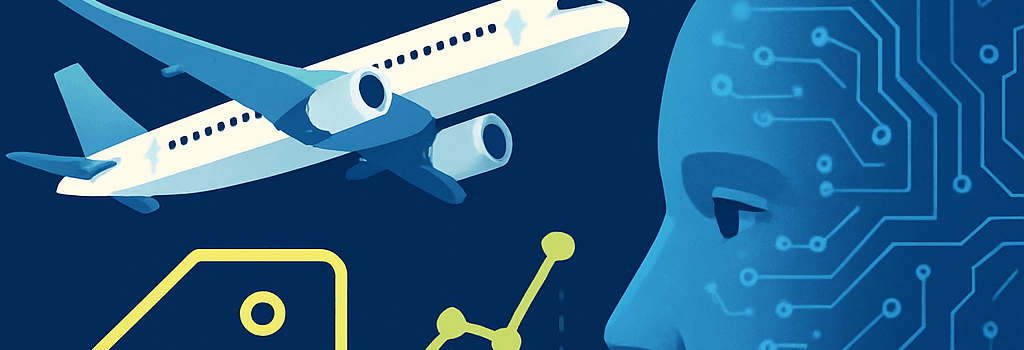AI and Personalized Pricing: Impact on Airfare Costs

Flying Into Controversy
Delta Air Lines has become the first major carrier to publicly deploy an AI-driven fare-optimization pilot, using real-time customer data to dynamically tailor ticket prices. Since late 2024, the airline’s system has adjusted fares on roughly 3% of domestic seats, with plans to expand to 20% by year’s end. While executives tout “amazingly favorable” revenue uplifts, consumer advocates warn that this form of individualized pricing could spell the end of universally low airfares.
“They’ll squeeze you for every penny,” Sen. Ruben Gallego (D-Ariz.) wrote recently on X, vowing to block Delta’s AI program as predatory pricing.
How AI Models Fuel Dynamic Fares
Delta’s pilot runs on technology from Israeli startup Fetcherr, which leverages a multi-arm bandit framework and ensemble ML models (XGBoost, LightGBM, TensorFlow neural nets) to optimize ticket prices in milliseconds. Key data inputs include:
- Device fingerprinting (user agent, screen size, OS)
- IP-geolocation and VPN detection
- Browsing history and search patterns (captured via first- and third-party cookies)
- Past purchase behavior and loyalty status
- Credit-card BIN ranges (to infer bank and purchasing power)
Integrating real-time streams through Apache Kafka and Flink, the system tests multiple pricing policies against conversion rates, then adjusts seat inventory prices via an automated reward signal—maximizing revenue while meeting revenue management and load-factor constraints.
Regulatory and Ethical Implications
The Federal Trade Commission has opened an inquiry into whether algorithmic price discrimination violates the FTC Act’s prohibition on “unfair or deceptive acts.” Meanwhile, several Senators, including Gallego and Richard Blumenthal, are drafting legislation to ban AI price-profiling in essential services. Under consideration:
- A federal mandate requiring transparency of AI pricing algorithms and differential-pricing bands.
- A prohibition on using protected attributes (race, gender, income bracket) as model features.
- Heavy fines for non-compliance, modeled on GDPR’s Article 22 on automated decision-making.
Technical Architecture of Delta’s AI Pricing System
Insiders reveal that Delta’s R&D team built a microservices architecture on AWS:
- Data Ingestion: Amazon Kinesis streams collect clickstream and transaction logs.
- Feature Store: AWS SageMaker Feature Store holds engineered variables—peak-load signals, propensity scores, customer lifetime value.
- Model Training: Distributed training on SageMaker using mixed CPU/GPU clusters with Horovod for synchronous SGD.
- Real-Time Inference: SageMaker Endpoint autoscaling to serve up to 10,000 TPS.
- Governance & Monitoring: AWS CloudTrail and GuardDuty for audit logs and anomaly detection; DriftWatch for model-drift alerts.
Delta’s CTO has indicated plans to migrate part of the pipeline to Google Cloud’s Vertex AI next year—seeking lower latency in Europe to comply with upcoming EU AI Act rules.
Consumer Countermeasures and Privacy Tools
Until legislation catches up, privacy experts recommend short-term tactics to level the playing field:
- Use a reputable VPN to mask geographic and browsing signals.
- Shop in incognito mode and clear cookies between searches.
- Leverage third-party booking platforms (e.g., Consumer Reports–backed services) as anonymizing agents.
Longer term, a federal privacy law—now under negotiation in Congress—could restrict consumer profiling and prohibit price discrimination based on sensitive data.
Deeper Dive: Economic and Competitive Impact
Economists caution that algorithmic collusion—where airlines implicitly coordinate pricing through similar AI policies—could erode competition. A 2025 MIT study simulated dynamic-pricing agents and found average fares could climb by 8–12% industry-wide within two years, even before factoring in fuel surcharges and ancillary fees.
Outlook: Innovation vs. Fairness
Delta’s leadership insists that AI personalization can benefit budget-conscious travelers by surfacing targeted fare promotions. Critics counter that without public audits of the underlying ML models and pricing bands, consumers will remain at a disadvantage—and the era of uniformly cheap flights may be over.
“AI should augment consumer choice, not replace it,” says Dr. Marina Lopez, a data-ethics researcher at NYU’s Tandon School of Engineering. “Transparent algorithms and explicit consent must be the baseline for any pricing system.”
As Delta scales up its AI pilot, the clash between technological innovation and consumer protection will intensify—raising fundamental questions about who gets to set the price for your next trip.